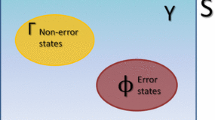Abstract
Reinforcement learning (RL) has been applied to constructing controllers for nonlinear systems in recent years. Since RL methods do not require an exact dynamics model of the controlled object, they have a higher flexibility and potential for adaptation to uncertain or nonstationary environments than methods based on traditional control theory. If the target system has a continuous state space whose dynamic characteristics are nonlinear, however, RL methods often suffer from unstable learning processes. For this reason, it is difficult to apply RL methods to control tasks in the real world. In order to overcome the disadvantage of RL methods, we propose an RL scheme combining multiple controllers, each of which is constructed based on traditional control theory. We then apply it to a swinging-up and stabilizing task of an acrobot with a limited torque, which is a typical but difficult task in the field of nonlinear control theory. Our simulation result showed that our method was able to realize stable learning and to achieve fairly good control.
Similar content being viewed by others
Author information
Authors and Affiliations
Corresponding author
Additional information
This work was presented, in part, at the 9th International Symposium on Artificial Life and Robotics, Oita, Japan, January 28–30, 2004
About this article
Cite this article
Yoshimoto, J., Nishimura, M., Tokita, Y. et al. Acrobot control by learning the switching of multiple controllers. Artif Life Robotics 9, 67–71 (2005). https://doi.org/10.1007/s10015-004-0340-6
Received:
Accepted:
Issue Date:
DOI: https://doi.org/10.1007/s10015-004-0340-6




